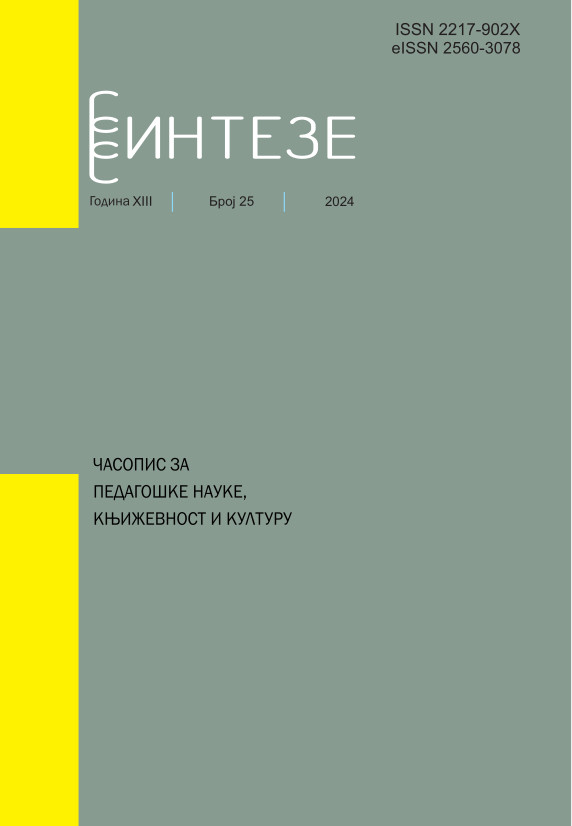Learning through play in mathematics lessons
Abstract
Of all human activities, the most pleasurable is the game, whether it is sports, computer, social, educational, or some other games. As the game is one of the most important needs of children, it is also the easiest way to introduce students to educational content. That is why learning through play is one of the most powerful motivational teaching methods, which encourages creativity in students expressed through imagination, logical thinking, emotional expression and motivation for work and learning. Learning through play also affects the all-round development of the student's personality, because it affects the cognitive, emotional, social and physical development of the child, preparing him for his future life in the world of adults.
References
Aldridge, S., & Badham, V. (1993). Beyond Just a Game. In Pamphlet Number 21. Primary Mathematics Association.
Antonyan, H. (2012, January 27). My Edu Way. https://myeduway.wordpress.com/2012/02/27/%d5%af%d5%b8%d5%b8%d6%80%d5%a4%d5%ab%d5%b6%d5%a1%d5%bf%d5%a1%d5%b5%d5%ab%d5%b6-%d5%b0%d5%a1%d6%80%d5%a9%d5%b8%d6%82%d5%a9%d5%b5%d5%b8%d6%82%d5%b6/janes1/
Bragg, L. (2006). Students` impressions of the value of games for the learning of mathematics. In J. Novotná, H. Moraová, M. Krátká, & N. Stehlíková (Eds.), Proceedings 30th Conference of the International Group for the Psychology of Mathematics Education (Vol. 2, pp. 217–224). International Group for the Psychology of Mathematics Education. https://dro.deakin.edu.au/articles/conference_contribution/Students_impressions_of_the_value_of_games_for_the_learning_of_mathematics/20549604/1
Davies, B. (1995). The Role of Games in Mathematics. Square One, 5(2), 34–45.
Janković, B. B. (2018). Projektna metoda u aktivnostima usvajanja matematičkih pojmova. Sinteze - Časopis Za Pedagoške Nauke , Književnost i Kulturu, 14, 79–90. https://doi.org/10.5937/sinteze7-17439
Offenholley, K. (2012). Gaming Your Mathematics Course: The Theory and Practice of Games for Learning. Journal of Humanistic Mathematics, 2(2), 79–92. https://doi.org/10.5642/jhummath.201202.07
Oldfield, B. J. (1991). Games in the Learning of Mathematics: 1: A Classification. Mathematics in School, 20(1), 41–43.
Özdoğan, E. (2011). Play, mathematic and mathematical play in early childhood education. Procedia - Social and Behavioral Sciences, 15, 3118–3120. https://doi.org/10.1016/j.sbspro.2011.04.256
Russo, J., Bragg, L., & Russo, T. (2021). How Primary Teachers Use Games to Support Their Teaching of Mathematics. International Electronic Journal of Elementary Education, 13(4), 407–419. https://doi.org/10.26822/iejee.2021.200
Russo, J., Russo, T., & Bragg, L. A. (2018). Five principles of educationally rich mathematical games. Australian Primary Mathematics Classroom, 23(3), 30–34.
Vankúš, P. (2005). Efficacy of teaching mathematics with method of didactical games in a–didactic situation. Quaderni Di Ricerca in Didattica, 15, 90–105.
Wager, A. A. (2013). Practices that Support Mathematics Learning in a Play-Based Classroom. In L. D. English & J. T. Mulligan (Eds.), Reconceptualizing Early Mathematics Learning (pp. 163–181). Springer Netherlands. https://doi.org/10.1007/978-94-007-6440-8_9
Copyright (c) 2024 Dalibor D. Teokarević

This work is licensed under a Creative Commons Attribution 4.0 International License.
Autori koji objavljuju u ovom časopisu pristaju na sledeće uslove:
- Autori zadržavaju autorska prava i pružaju časopisu pravo prvog objavljivanja rada i licenciraju ga "Creative Commons Attribution licencom" koja omogućava drugima da dele rad, uz uslov navođenja autorstva i izvornog objavljivanja u ovom časopisu.
- Autori mogu izraditi zasebne, ugovorne aranžmane za neekskluzivnu distribuciju članka objavljenog u časopisu (npr. postavljanje u institucionalni repozitorijum ili objavljivanje u knjizi), uz navođenje da je članak izvorno objavljen u ovom časopisu.
- Autorima je dozvoljeno i podstiču se da postave objavljeni članak onlajn (npr. u institucionalni repozitorijum ili na svoju internet stranicu) pre ili tokom postupka prijave rukopisa, s obzirom da takav postupak može voditi produktivnoj razmeni ideja i ranijoj i većoj citiranosti objavljenog članka (Vidi Efekti otvorenog pristupa).

